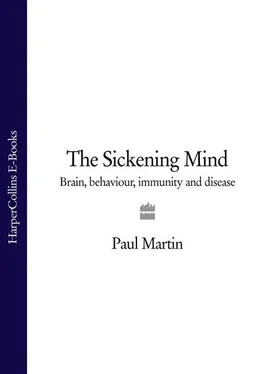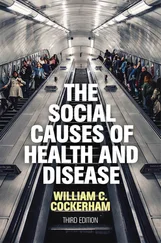In order to disentangle cause and effect in this type of research it is vital to establish which came first, the life events or the illness. There is plenty of evidence that life events do indeed tend to precede illness, which suggests that they may genuinely contribute to ill health.
A third pitfall with life event research, especially in its early days, has been its retrospective nature. When investigators ask subjects to recall their life events during, say, the previous year, great reliance is placed on frail and faulty memories. And therein lies a weakness. It is an awkward fact of life that most of us grossly over-estimate our ability to recall the past accurately and objectively. Ask any policeman, lawyer or judge about the reliability of witnesses to crimes. Psychologists have found that after a period of ten months people are typically able to recall life events with an accuracy of only 25 per cent. Conclusions that depend on people’s memories of what happened to them one or two years ago are therefore bound to be suspect.
As well as the inherent difficulty of recalling past events accurately there is also a danger of systematic bias. People who are unwell may focus on a particular trauma in their past and assume it must have been responsible for their illness. We all have a basic need to find explanations for our illnesses and some people understandably attribute their poor health to traumatic experiences. But in doing so they inadvertently undermine the objectivity of the research data.
Fortunately, not all research on life events has had to rely on faulty memories. Instead, scientists have monitored groups of initially healthy subjects over a period of time, recording their life events and illnesses as and when they happen. This style of research is referred to as prospective, in contrast to the backward-looking retrospective method. And plenty of these prospective studies have borne out the link between life events and subsequent illness.
Another potential pitfall lies in failing to distinguish between an interviewee’s actual health, as measured according to objective, clinical criteria, and what they say or think about their health. The problem here is not that people deliberately lie; the majority of those who volunteer to take part in scientific research try hard to be truthful. The real problem is that few of us are capable of being entirely objective about our own health. We all perceive and interpret our physical symptoms in different ways; something that would constitute a distressing malady for one person might not even be noticed by another.
Problems also arise if we attempt to measure health in terms of what is called sickness-related behaviour. This means behaviour like going to the doctor or taking sick leave from work. Sickness-related behaviour is obviously not the same thing as actual sickness.
The way humans respond when they think they are ill depends on other factors besides their state of health, including such mundane considerations as whether expert medical advice is freely and conveniently available. Sickness-related behaviour is often more a reflection of psychological factors than physical health.
To complicate matters further, people’s perception of their own state of health varies according to their mental and emotional state. Anxious or stressed individuals, for example, are more apt to notice and worry about minor symptoms, interpret them as evidence of disease and seek expert help. Someone who has been experiencing lots of stressful life events is more likely to feel unwell and visit their doctor, but this does not necessarily mean that they are actually ill.
We shall be looking at this issue in more depth in the next chapter. Suffice it here to say that there is a world of difference between believing yourself to be ill, or going to the doctor, and having a clinically verifiable disease. For this reason, research that relies wholly on self-assessments of health or on sickness-related behaviour can be misleading. Such measures often say more about people’s mental state than they do about their true physical health. I should add, however, that the dubious practice of using sickness-related behaviour as an ersatz measure of health is a pervasive problem in medical research and is certainly not unique to work on life events.
Despite these caveats there is consistent evidence, garnered from thousands of scientific studies, for a connection between life events and subsequent illness. It is now clear that even the mundane hassles of everyday life have an impact on physical health. Indeed, some scientists have argued that because these hassles are such a frequent occurrence their cumulative influence on health may be more pervasive than the effects of rarer, but more traumatic life events.
The general idea that psychological factors can affect susceptibility to physical illness is amply supported by research on other species. As in so many other respects there is nothing biologically unique about humans. Several decades of experimental work on other species have confirmed that various forms of psychological stress can increase (or, occasionally, decrease) animals’ susceptibility to a wide spectrum of diseases, including bacterial and viral infections, heart disease and cancer.
For instance, when mice or rats are exposed to stressful situations, such as being physically restrained or subjected to unpleasant electric shocks, they become less resistant to infection with a whole range of bacteria, viruses and parasites including mycobacteria (the type of bacteria responsible for tuberculosis), herpes viruses, influenza viruses, polio viruses and the protozoa which cause toxoplasmosis. In one experiment, for example, frightening mice by exposing them to a cat significantly increased their vulnerability to infection with a parasitic tapeworm. (The cat was prevented from attacking the mice; the sight of it alone was enough to affect them.) Likewise, the social stress of being introduced into an unfamiliar flock makes chickens more susceptible to bacterial infections, while the stress of being transported renders cattle vulnerable to a form of viral pneumonia caused by the reactivation of latent herpes viruses.
The sheer volume of animal research in this field makes it impossible to describe more than a tiny and rather haphazard selection of examples. And some of the experiments, especially those performed in the dim and distant past, are too grisly and unethical to deserve a mention. We humans are not the only animals whose physical health can be damaged by upsetting events.
The mind and the common cold
The way in which psychological factors can affect our susceptibility to disease is illustrated by research on that most mundane of illnesses, the common cold.
For centuries it has been widely believed that stress makes us more prone to minor respiratory infections such as colds and ’flu. This has now been confirmed experimentally. It is surprising that until recently much of the scientific evidence regarding the effects of psychological factors on respiratory infections was suggestive rather than conclusive.
In one study, for example, researchers asked married couples to fill in a questionnaire each day for three months, recording the various stresses and hassles of everyday life together with their state of health. The results showed that respiratory infections tended to be preceded by a greater than average degree of stress. Typically, a few days before the onset of symptoms there would be a rise in the number of unpleasant life events and a drop in the number of desirable events.
Much firmer evidence came from a pioneering experiment in which psychologist Richard Totman and colleagues infected healthy volunteers with cold-inducing rhinoviruses, having first assessed each individual’s psychological profile. It transpired that personality and previous exposure to stress had a significant bearing on both the risk of infection and the severity of the subsequent cold. Individuals with introverted personalities developed more severe colds, as did those who had experienced certain types of stressful life events.
Читать дальше












